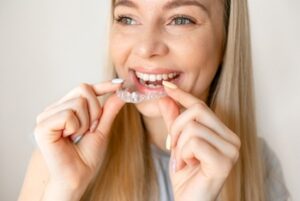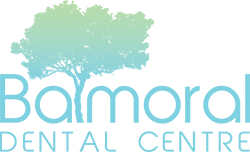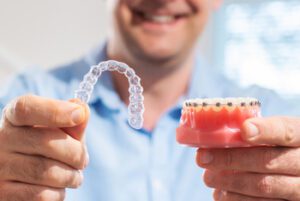Invisalign is a popular choice for orthodontic treatment, offering a discreet and comfortable way to straighten teeth. However, maintaining oral hygiene is crucial during any orthodontic treatment, including Invisalign. One common concern for patients is whether they can undergo deep teeth cleaning while using Invisalign aligners. Understanding how deep cleaning works in conjunction with Invisalign can help ensure optimal oral health throughout your treatment journey.
Understanding Invisalign Treatment
Invisalign treatment is an innovative orthodontic solution that straightens teeth using clear, custom-made aligners. This contemporary teeth straightening method provides numerous advantages, especially in aesthetics and convenience. Here, we delve deeper into what Invisalign treatment involves, its advantages, and its commitment to ensure its effectiveness.
What is Invisalign?

How Does Invisalign Work?
The Invisalign process commences with a consultation with a dentist. At this appointment, your dental professional will capture digital impressions, photographs, and X-rays of your teeth. These detailed records are utilised to create an accurate 3D model of your teeth, which forms the basis of your personalised treatment plan.
Each set of aligners is worn for about two weeks before being replaced by the next set in the series.
The Importance of Oral Hygiene During Invisalign Treatment
Proper oral hygiene is vital while undergoing Invisalign treatment. Inadequate oral care can cause tooth decay and gum disease, potentially complicating your treatment.
Common Dental Problems During Orthodontic Treatment
While wearing aligners, food particles can get stuck between your teeth and the aligners, elevating the risk of bacterial growth, plaque buildup, and subsequent dental problems. Regular brushing and flossing help mitigate these risks, but professional cleaning is often necessary to ensure thorough cleaning.
Can I Get Deep Teeth Cleaning while Using Invisalign?
Maintaining optimal oral hygiene during Invisalign treatment is crucial to success. A common question is whether deep teeth can be cleaned while wearing Invisalign aligners. Let’s delve into the details to understand this better.
Deep Teeth Cleaning Explained
Deep teeth cleaning, or scaling and root planing, is a thorough dental procedure to treat and prevent gum disease. Unlike regular dental cleanings that focus on the surfaces of the teeth, deep cleaning targets the areas beneath the gum line. This procedure involves two main steps:
- Scaling includes removing plaque and tartar (hardened plaque) from the tooth surfaces and below the gum line. Specific dental tools are used to scrape away these deposits, which cannot be removed by regular brushing and flossing.
- Root Planing: After scaling, root planing smooths out the root surface to help gums reattach to the teeth. This process reduces the pockets that can form between the teeth and gums, which are prone to trapping bacteria and causing further gum disease.
Deep Cleaning During Invisalign Treatment
It is entirely possible and often advisable to undergo deep teeth cleaning while you are wearing Invisalign aligners. Here’s why:
Prevents Gum Disease: 
Ensures Treatment Progress: Keeping your teeth and gums healthy is essential for the success of your Invisalign treatment. Gum disease and tartar buildup can hinder your aligners’ proper fit and function, potentially delaying your treatment progress.
Maintains Oral Health: Deep cleaning ensures that oral health is not compromised during orthodontic treatment. Healthy gums and teeth are pertinent for the aligners to work effectively, as they rely on the underlying structures being healthy and stable.
Practical Tips for Maintaining Oral Hygiene with Invisalign
Brush your teeth at least twice a day with a soft, bristled toothbrush and fluoride toothpaste. Flossing regularly helps remove food debris and plaque from between your teeth and around your aligners.
Using Invisalign Cleaning Crystals
These are specifically designed to clean your aligners. They help remove plaque and harmful substances, keeping your aligners clear and fresh.
Routine Dental Cleanings
Schedule routine dental cleanings every six months, or more frequently if advised by your dentist.
Choosing the Right Dental Hygiene Products
A soft toothbrush, fluoride toothpaste, and dental floss can help maintain good oral health. You can also consider mouthwash and interdental brushes.
Invisalign vs. Traditional Braces: Oral Hygiene Comparison
Choosing between Invisalign aligners and traditional braces involves considering various factors, including aesthetics, comfort, and ease of maintaining oral hygiene. This section explores the differences in oral hygiene routines and challenges associated with each orthodontic treatment.
Invisalign Aligners
Invisalign aligners offer several advantages, particularly in terms of oral hygiene.
One of the most significant benefits of Invisalign aligners is that they are removable. This feature makes it much easier to clean your teeth and gums effectively. Here’s how:
- Brushing and Flossing: Because the aligners are detachable, you can brush and floss your teeth as usual without any hindrance. This allows you to keep a comprehensive oral hygiene routine, minimising the risk of plaque accumulation and gum disease.
- Cleaning the Aligners: The aligners themselves can be cleaned separately. You can use a soft toothbrush and clear, unscented soap or specialised cleaning solutions like Invisalign cleaning crystals. This dual-cleaning approach helps keep both your teeth and aligners free from harmful bacteria and plaque.
Reduced Risk of Dental Issues
By allowing you to maintain a proper oral hygiene routine, Invisalign aligners help minimise common dental issues associated with orthodontic treatments, such as:
- Plaque Buildup: Plaque can easily accumulate around traditional braces, but with removable aligners, you can clean your teeth thoroughly, preventing plaque formation.
- Gum Disease: Good oral hygiene reduces the risk of gum inflammation and periodontal disease, conditions often exacerbated by the challenges of cleaning around traditional braces.
- Cavities: Regular and effective brushing and flossing help prevent cavities, a common concern with braces where food particles can become trapped.
Traditional Braces
Conventional braces consist of metal brackets and wires affixed to the teeth, presenting unique challenges in maintaining oral hygiene.
The fixed nature of traditional braces makes cleaning more difficult. Here are some specific challenges:
- Brushing:

- Flossing: Flossing with traditional braces requires additional tools, such as floss threaders or orthodontic floss picks, to manoeuvre the floss around the wires. This can be time-consuming and cumbersome, leading some patients to neglect this important aspect of oral hygiene.
Increased Risk of Dental Issues
Due to the difficulties in maintaining cleanliness, traditional braces are associated with a higher risk of certain dental problems:
- Plaque and Tartar: The inability to clean thoroughly around the braces can lead to increased plaque and tartar buildup, which are precursors to cavities and gum disease.
- Gum Disease: Inadequate cleaning can result in gingivitis, characterised by swollen, bleeding gums.
- Tooth Decay: Food particles trapped in and around the braces can lead to tooth decay. The brackets can create small spaces where bacteria thrive, increasing the risk of cavities.
Special Considerations for Oral Hygiene with Braces
To mitigate these risks, patients with traditional braces need to adopt a rigorous oral hygiene routine:
- Orthodontic Brushes and Tools: Utilising specially designed orthodontic toothbrushes, interdental brushes, and floss threaders can aid in more effectively cleaning around the brackets and wires.
- Regular Dental Visits: More frequent visits to the dentist for professional cleanings are recommended to remove plaque and tartar that home care might miss.
- Dietary Restrictions: Patients with traditional braces are frequently advised to avoid specific foods that can harm the brackets and wires or easily get stuck, such as hard candies, sticky foods, and crunchy snacks.
In conclusion, both Invisalign aligners and traditional braces effectively straighten teeth, but Invisalign provides notable benefits for maintaining oral hygiene. The removable aligners allow for thorough cleaning, which decreases the risk of plaque buildup, gum disease, and tooth decay. Conversely, traditional braces pose more challenges for oral hygiene due to their fixed components and the necessity for specialised cleaning tools.
The Scaling Process: What to Expect
Your dentist will examine your teeth to determine the amount of plaque and tartar buildup. X-rays might be taken to evaluate the health of your teeth and gums.
During the Procedure
The scaling process uses specialised tools to eliminate plaque and tartar from both above and below the gum line.
After the Procedure
You might experience some sensitivity and discomfort after the procedure, which should subside in a few days. Your dental hygienist will provide aftercare instructions to ensure a smooth recovery.
Periodontal Diseases: Prevention and Treatment
Periodontal diseases impact the gums and the supporting structures of the teeth. They can vary from mild gingivitis to more severe periodontitis, which, if left untreated, can result in tooth loss.
Preventing Periodontal Diseases
Maintaining good oral hygiene is very important in preventing periodontal diseases. Regular brushing, flossing, and professional cleanings help remove plaque and bacteria that cause gum infections.
Treating Periodontal Diseases
If you develop gum disease during Invisalign treatment, deep cleaning is necessary. In severe cases, additional treatments such as antibiotics or surgery may be required.
Maintaining Good Oral Health During Invisalign Treatment
While Invisalign aligners offer a discreet and convenient way to correct dental alignment, maintaining good oral health throughout the treatment process is paramount. Proper oral hygiene ensures the aligners’ effectiveness and prevents common dental issues such as cavities, gum disease, and bad breath.
Regular Dental Check-Ups
Regular dental evaluations are crucial for monitoring your oral health and your treatment progress. Your dental professional can identify early signs of dental issues and offer prompt treatment.
Adopting a Comprehensive Oral Hygiene Routine
A comprehensive oral hygiene routine includes brushing, flossing, and using mouthwash. Clean your aligners regularly to prevent bacterial accumulation and ensure they function effectively.
Diet and Lifestyle Considerations
Be aware of anything that can stain your aligners, such as coffee and red wine. Ensure you maintain a diet rich in vitamins and minerals to support your dental health.
Frequently Asked Questions
As you navigate your Invisalign treatment journey, it’s natural to have questions about various aspects of the process. From understanding how to care for your aligners to knowing what to do in case of specific dental concerns, having clear and concise information can help ease any uncertainties.
Can I Eat with My Aligners In?

How Often Should I Clean My Aligners?
Clean your aligners at least once a day using Invisalign cleaning crystals or a soft toothbrush and clear soap.
Can Deep Cleaning Affect My Invisalign Treatment?
No, deep cleaning is beneficial and helps maintain good oral health, which is crucial for the success of your Invisalign treatment.
How Do I Know If I Need Deep Cleaning?
You might need deep cleaning if you experience symptoms like bleeding gums, bad breath, or gum sensitivity. Consult your dentist for a thorough evaluation.
What Should I Do If My Aligners Become Stained?
Soak them in Invisalign cleaning crystals and brush gently with a soft toothbrush. Avoid using toothpaste or harsh cleaners.
Conclusion: Take Action for a Healthy Smile
Deep teeth cleaning can be performed safely and effectively while wearing aligners, helping to prevent more serious dental issues. Schedule a consultation with us today to ensure your teeth and gums stay healthy.
Make your dental health a priority to achieve the most viable results from your Invisalign treatment. Contact us now, and let us help you maintain a healthy, radiant smile!
Contact Balmoral Dental Centre at 07 3113 9789 to regain your smile and confidence!
References:
https://www.forbes.com/health/dental/what-is-invisalign/
https://www.webmd.com/oral-health/invisible-orthodontic-aligners
https://www.healthline.com/health/how-to-clean-invisalign
https://www.everydayhealth.com/dental-health/invisalign-vs-braces-which-is-better/


